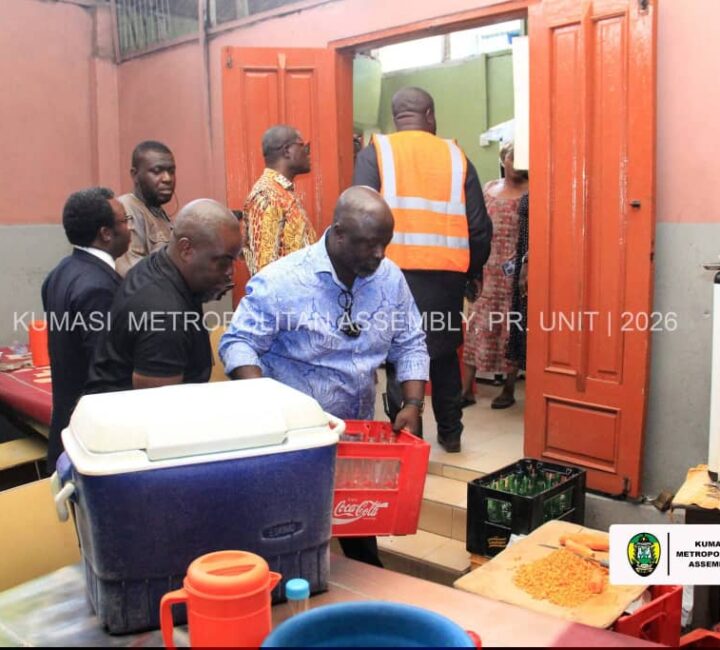Food and Environmental Hygiene: – our Safety priority towards sustainable health
Food related illnesses have been considered serious public hazards globally and have been identified as one of the major causes of sicknesses and death worldwide, especially in developing countries.. It is worrying that, here in Ghana, because a witch or demon gets blamed for deaths and sicknesses, food handlers / operatives and authorities in boarding schools and other institutions, more often than not, get away with noncompliance with the provisions of the Food Laws in the country. Most of the food related illnesses result from poor sanitary conditions under food is procured, processed and stored in institutions (boarding schools, hospitals, hostels, prisons, camps, commercial kitchens), coupled with inadequate literacy or training of food handlers and lack of provision of appropriate cleaning materials. Poor food handling practices could be regarded as the key “culprits” causing food related offences. As much as we don’t overlook the operations of demons and evil spirits, in many cases, these real ‘culprits’, non compliant food handlers, get away with murder whilst we get busy pointing accusing fingers at the witches and other spiritual agents, . These practices expose the consumers to food hazards namely- physical, biological (microbiological) and chemical, leading to several hospitalizations and unfortunate deaths. Biological (microbiological) hazards are the leading causes of food related illnesses and intoxications.
Depending on their roles, microorganism could be classified into four major groups: inert, spoilage, beneficial or pathogenic.
• Inert (their presence in food produces neither positive nor negative effects)
• Spoilage (their presence, activities and /or metabolites lead to the deteriorating of sensory attributes of food)
• Pathogens (their presence, activities and /or metabolites result in illnesses and intoxications that could result in death)
• Beneficial (their whose presence, activities and /or metabolites result in beneficial food, drug and industrial products)
The type of microorganism present in a food commodity (microbial type) and also the number of microorganisms present (microbial load) coupled with environmental conditions will determine the rate at which food gets spoilt, becomes toxic or gets converted to a beneficial product.
With the activities of microorganisms, if prudent measures are not taken, including strict management systems for food and environmental audit trails, whole villages and settlements could be wiped out. In my trainings of food handlers, I emphasize to them how ‘powerful’ these unseen soldiers are. The microorganisms are so tiny that a whole colony of about 500, 000 to a million will not be bigger the head of a pin. Given time, they multiply rapidly and their physical presence or products of their metabolism could lead to potentially devastating consequences. It is imperative, therefore, for handlers of food in every system to know about the operations and metabolic activities of microorganisms, the sources and routes of entry into our food system and the potential danger they could cause to consumers.
Given the conditions prevailing in the kitchens at our boarding schools and other institutions, microorganisms have a field’s day to operate and wreak havoc, causing loss of health, life and business. In fact, the danger that those who encounter the ‘wrath’ of these pathogenic microorganisms face is no child’s play. Sicknesses, spontaneous abortions, permanent disabilities, hormonal imbalance, cognitive dysfunction, cancers, loss of money and even death are some consequences.
A food handler could be a horde or haven of microorganisms from the head to the feet, if conducive growth conditions for microorganisms are given.
Microorganisms are like unseen soldiers. A colony of microorganisms, comprising over a million and over bacteria, viruses etc., could be so small that it can fit onto the head of a pin. They actually need conditions provided by our institutions and our surroundings (boarding schools, hostels and prisons etc) – food, moisture, appropriate temperature, pH (acidity) and time. In our institutions, the conditions are rife for microbial (bacterial) activity and multiplication. Microorganisms need an average of twenty minutes to multiply by binary fission. This is called the generation time. In binary fission, within the generation time, there is doubling of numbers of microbes (one microorganism becomes two, two become four etc). In effect, in approximately 20 minutes, there is the doubling of whatever number of microorganisms is present in food or system. This implies that, if cooked food is left for a couple of hours, microbial numbers would increase exponentially if conducive conditions exist. The growth (multiplication) and metabolic activities of pathogenic microorganisms may lead to the accumulation of toxins and metabolites that may not necessarily be heat labile/sensitive and may likely cause devastating consequences even when the microorganism (which is a living organism) has been eliminated through thermal applications or as result of death through the action of the microorganism’s own toxins.
Institutions should be mandated/encouraged /requested to do a simple documentation of food or commodities received; storage conditions; expiry and ‘use by’ dates of foods; waste disposal systems; and training schedules of the food handling staff. The source of ingredients could be another worrying issue. For bulk buying for feeding institutionalized persons (in boarding schools, prisons, hospitals etc) and for large scale catering purposes, a very unfortunate practice is either condoned or encouraged. Efforts are made by officers in charge of procuring food items to purchase the cheapest of commodities which already show signs of deterioration like mould growth on vegetables leading to softening; and discoloration of meat. To make matters worse, in most of our markets, food commodities are sold on the floor or on a very thin paper, jute, plastic or polythene sheet – not on elevated surfaces. The conditions of the industrial or commercial mills (nika nika) used in the markets for milling and blending food stuff are utterly disgusting. Some of these food commodities may not be heat processed before consumption, therefore acting as potent sources of introduction of microorganisms into the food chain. Some cheap sub-standard imported products, like poultry, beef and other products could cause a lot of problems for consumers as they may contain unacceptable levels of food hazards.
Food handlers/operatives (in institutions and those involved in commercial large scale food and beverage production) must be trained on the consequence of their actions and inactions on the consumer and future generations. It is imperative that they receive enough training commensurate with their level of operation.
There should be education and training in the rudiments of hygiene for all in the food supply chain: actually, the four (4) pillars upon which all protocols of hygienic operations revolve-
• PROTECTING food from contamination and decontaminating food by thorough washing
• PREVENTING bacteria present from multiplying
• DESTROYING any harmful bacteria
• DISCARDING any unwholesome food and rejecting contaminated food or food from unreliable sources
Planned training schedules should be organized for all operatives in the food chain: farmers, transporters, distributors, storage, retailers, market women/men, cleaners, cooks, chefs, waiters etc.
Training should encompass the integrity of supply value chain from farm to fork: sourcing, traceability, methodology, cleaning operations, storage, preparation and consumption.
Training should target everyone in the food business, no matter the size- micro, small, medium, large).
The populace must be educated on personal, food and environmental hygiene. Personal hygiene training, which must be devoid of jargons must target everyone from the youngest to the oldest to appreciate the need to prevent food borne illnesses by ensuring that each one prevents him or herself from contracting a disease; or being a medium or vehicle for transferring pathogens to the consumer.
Proper and frequent hand washing with soap, especially, before these activities are prudent ways of ensuring high level of hand hygiene and to prevent transfer of these invisible microorganisms from our hands onto food or food preparation surfaces. Hand must be properly washed before eating; preparing food; serving food and drink.
After engaging in these activities the hands MUST be thoroughly washed with soap and water – Visiting the washroom (even if you don’t do anything); touching money; shaking hands with somebody (if it must be done for cultural reasons); touching rubbish or carcass among others.
On Environmental hygiene, the populace must be encouraged to desist from engaging in activities that accumulate filth in the environment, therefore acting as conducive breeding grounds for microorganisms, pests like houseflies, cockroaches and other insects; rodents like rats, mice, etc., and the release of unpleasant gases which could be toxic at high concentrations. Such activities include, but not limited to, open defaecation in drains, beaches, water bodies and backyards; and indiscriminate disposal of waste from food, industry and other sources. These activities could have devastating effects including chronic health conditions.
There is an urgent need to set up systems of internationally accepted standards, that are locally suitable and understood, to save our future generations from being wiped, or becoming maimed or mentally challenged. Quite a huge task on our hands. With a concerted synergetic approach involving all stakeholders Governmental and Non- Governmental agencies, institutions and individuals, our food will be safe and food system will be secured for us and our children and for posterity.
GOD BLESS OUR HOMELAND GHANA.
DR PATRICIA OWUSU-DARKO
The writer is a Senior Lecturer in the Faculty of Applied Sciences and Technology, Kumasi Technical University and the Deputy Director of the Institute of Research Innovation and Development. She is a Food Safety Consultant/ Food Policy analyst/Trainer in Food Safety and Hygiene and Food Product Development
Mobile 00233207618397
Email patricia.owusu-darko@kstu.edu.gh



















































